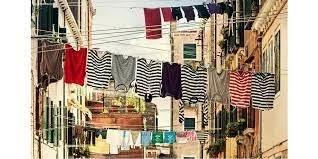After the Ecstasy the Laundry
Laundry - the everyday stuff of life
Her interjection was perfect for the moment. The Committee of Twelve (CO12) had gathered to determine the next steps after the May 21st event wherein over 125 Maryknollers from all four expressions participated. A subcommittee from the CO12 synthesized the collected input from the breakout groups. The synthesis revealed a thoughtful, rich, expansive and hopeful underlying vision about a new way of being Church and a common vision for Maryknoll (available soon).
All of us on the CO12 were in elevated spirits. There was something vital, encouraging and anticipatory in the synthesis of responses. It was at that moment that Ann Carr, Affiliate and contemplative woman that she is, proffered this consideration: “After the ecstasy the laundry.”
That consideration is also the title of a book by Jack Kornfield, a clinical psychologist who trained for years a Buddhist monk in Thailand and Burma (now Myanmar). Even moderately awakened people know about the laundry. We can have moments of profound spiritual enlightenment (ecstasy) but taxes, credit card bills and house cleaning don’t go away. Neither do our occasional petty reactions, uninvited cravings (that extra piece of cake or third glass of wine) nor ego-protecting reactions go away, at least not initially. Still, we remember the ecstasy.
Ann’s reference to Kornfield’s quote prompted me get the book – surprisingly available in my small town library. In the early pages he relates the Russian initiation tale of Baba Yaga, an old woman with a hag-like appearance living deep in the forest, who stirs her cooking pot and knows all things. The tale is about the honesty that the spiritual journey requires of us. As Kornfield relates, we are frightened to seek her out because she requires that we step into the dark, to ask perilous questions, and move outside the world of logic and comfort. Three terrified seekers come to the door of her hut in the deep forest. To each Baba Yaga asks, “Are you on your own errand or are you sent by another?” The first seeker, a young man encouraged in his quest by his family, answers, “I am sent by my father.” Baba Yaga promptly throws him into the pot and cooks him. The second is a young woman who, in response to Baba Yaga’s question about coming on your own volition or being sent by another, responds, “I am on my own errand”. Baba Yaga throws her in the pot and cooks her too. I’m guessing you’re getting the impression that Baba Yaga is not going to be invited to have her own TV cooking show. Finally the third seeker, another young woman, deeply confused by the world, approaches the hut with trepidation. To Baba Yaga’s dreaded questions, she answers truthfully. “In large part I’m on my own errand, but in large part I also come because of others. And in large part I’ve come because you are here and because of the forest, and something I have forgotten, and in large part I know not why I come.” Baba Yaga regards her for a moment and says, ‘You’ll do” and allows her into the hut.
I think just about all of us reading this tale know that there is something more, a deeper yearning that pulls us out of our protective spaces and creature comforts into the forest in search of love, of Love.
